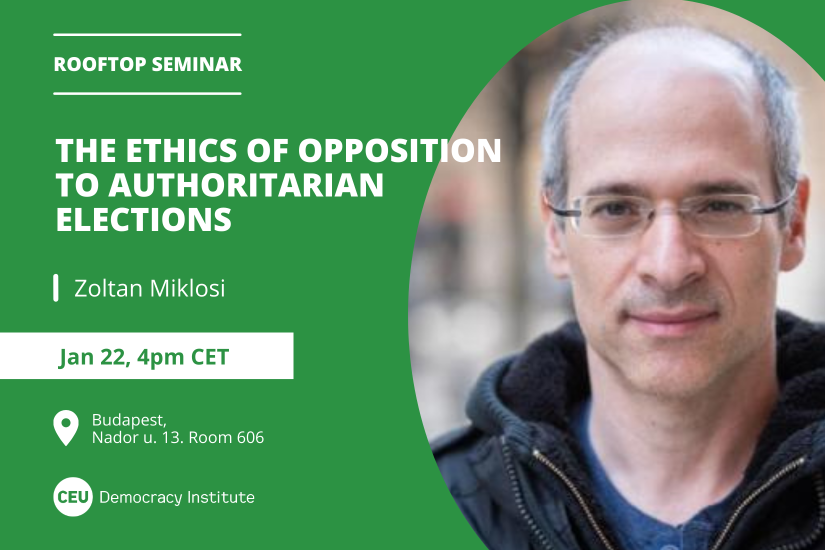
The De- and Re-Democratization (DRD) Workgroup of the CEU Democracy Institute cordially invites you to its next Rooftop Seminar.
If you would like to attend, please register here.
Please keep in mind that external guests cannot enter the building without prior registration. Due to space restrictions, attendance is limited. We ask registered visitors to pick up their temporary visiting card at the reception. The event is not open to the press.
Abstract:
Electoral autocracies hold pluralistic and somewhat competitive elections, yet they lack democratic legitimacy. Therefore, electoral autocracies confront democratic challengers with pressing moral questions. First, since only democratic elections can confer legitimacy on the winners, it may be suggested that defeating such regimes through elections is normatively futile: even if challengers win, they cannot exercise power legitimately. Democratic challengers who compete in such elections, it may seem, involve themselves in a contradiction: they denounce autocratic elections as illegitimate and yet they engage in them. Second, competing in autocratic elections is strategically futile, critics argue, because it contributes to the façade of democracy and helps entrench autocratic regimes. In this paper I defend three claims. First, the normative effects of autocratic elections are asymmetrical: while they cannot confer democratic legitimacy on the ruling party, they can confer it on democratic challengers, should they win. I call this the asymmetry thesis. Second, the normative function of elections changes in autocratic settings. In democracies, their primary function is to settle political disagreements in a fair manner, while in autocracies, they constitute a form of self-defense. Third, when compared with feasible alternatives, autocratic elections are often but not always the normatively favored option according to the criteria of defensive ethics.
The paper is available upon request from the author.
Speaker:
Zoltan Miklosi has been teaching political philosophy at CEU's Department of Political Science since 2009. He received his Ph.D. in Philosophy from ELTE University. He specializes in political and moral philosophy. His research interests range from more abstract questions about the basis and significance of equality, through problems of global political morality, to moral questions concerning the citizen-state relationship in defective democracies and so-called "hybrid regimes." His recent publications include "Equality of Opportunity and the Presumption of Equality," Springer Handbook of Equality of Opportunity (2023), "Cosmopolitanism and Unipolarity: The Theory of Hegemonic Transition" (with Jelena Belic), Critical Review of International Social and Political Philosophy (2023). Since December 2021, he serves as work package leader in the Good Integration project funded by the Norwegian Research Council. He has been teaching courses in introduction to political philosophy, cosmopolitanism and global justice, and democratic theory. In 2014/15 he was a Laurance S. Rockefeller Visiting Faculty Fellow at the University Center for Human Values, Princeton University.
Discussant:
Janos Kis is a political philosopher, graduated from ELTE in 1967. Researcher at MTA Institute of Philosophy until 1973 when dismissed for political reasons. A leading participant of the dissident movement, co-founder and first president of SZDSZ, a left-liberal party at the time of Hungary’s transition to democracy. Since 1992, affiliated with CEU as professor of philosophy & political science. Senior Research Fellow at DI since 2020. Research focus on moral and political equality, liberal foundations of democracy, conceptual characteristics of electoral autocracy. Books in English include; Constitutional Democracy (2002); Politics as a Moral Problem (2008), How Is Critical Economic Theory Possible?.
Chair:
Andreas Schedler is a Senior Research Fellow at the CEU Democracy Institute. He is the Lead Researcher of the De/Re-Democratization Working Group and a Visiting Professor at CEU Vienna. He earned his PhD from the University of Vienna. Before joining the CEU, he was a professor of political science at the Center for Economic Teaching and Research (cide) in Mexico City. A leading comparative scholar of democracy, democratization, and authoritarianism, he has conducted research on democratic consolidation and transition, authoritarian elections, anti-political-establishment parties, political accountability, and organized violence. He is also known for his methodological work on concept analysis and cross-national measurement. His current research focuses on political polarization and the destruction of basic democratic trust.